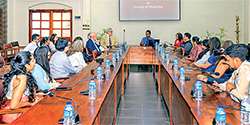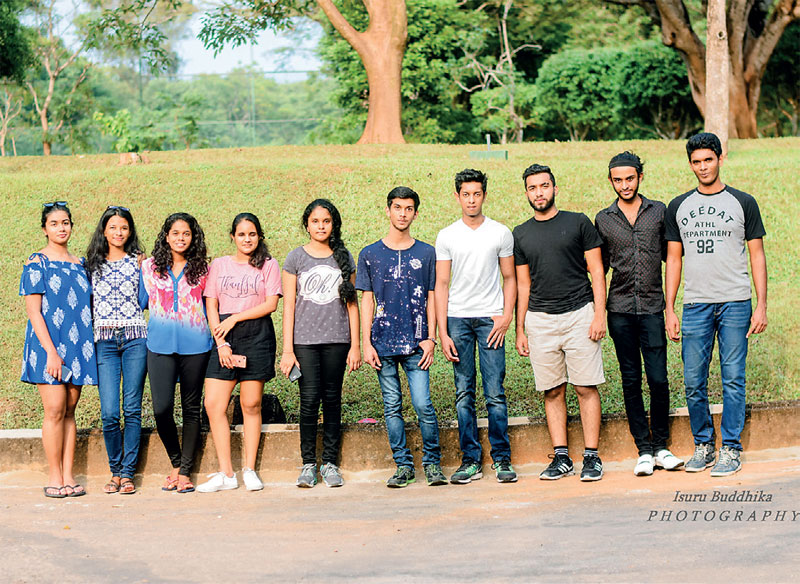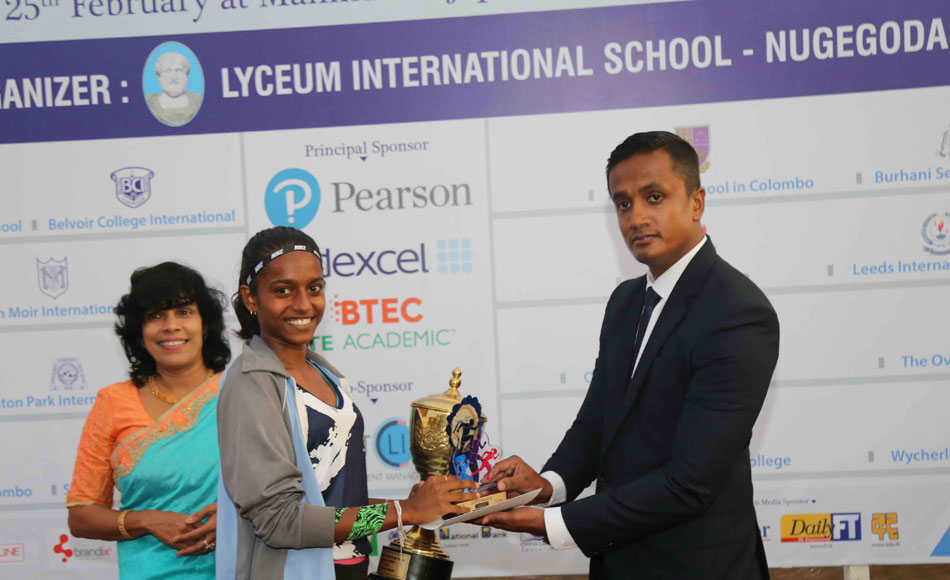NIBM -TDF Model for Human Performance Improvement
 Th e H P I ( H u m a n Performance Improvement) process of NIBM follows a result –based approach to improve performance of its learners. TDF is a novel approach for Human Performance Improvement, which is based on three major pillars of human talent development process to produce tangible and effective outcomes in business or any other organization. TDF stands for Thinking, Doing and Finishing and this approach identifies the key attributes to develop productive people and focuses on major issues on human talent development, which may go beyond the need of knowledge and skills of people.
Th e H P I ( H u m a n Performance Improvement) process of NIBM follows a result –based approach to improve performance of its learners. TDF is a novel approach for Human Performance Improvement, which is based on three major pillars of human talent development process to produce tangible and effective outcomes in business or any other organization. TDF stands for Thinking, Doing and Finishing and this approach identifies the key attributes to develop productive people and focuses on major issues on human talent development, which may go beyond the need of knowledge and skills of people.
What is HPI?
HPI is a field of study related to business process improvement using the best practices of Human Resources Development (HRD). Traditional training is only about 5 to 10 percent effective in obtaining meaningful performance results. A new approach is needed for the new generation especially the Gen Z. The HPI process provides you with a structure to follow what human performance requirements to be focused in business process improvement. HPI is result based and systematic. It follows a result - based approach to improve performance, distinguishing it from many Human Resource Development activities. The process is driven by business needs and human talent requirements.
What is TDF?
TDF stands for Thinking, Doing and Finishing. These are the three major pillars on which the quality of NIBM learners is grown-up and molded. In keeping with the industry needs in mind, NIBM has developed its teaching strategy around three major skills/ attributes so that its graduates will end up acquiring three major skills that are critical in building their future prospects. NIBM’s teaching methodology, teaching technology and other learning facilities are aimed at building these three key attributes. In simple terms, these are geared to make students THINKERS, DOERS and great FINISHERS. To be a THINKER, one needs the POWER TO CREATE: In order to be creative, an individual should have the ability to perceive things in new ways or relate things or ideas which were previously unrelated. Simply creativity is the ability to look where everyone else is looking and see what no one else can see. This occurs in the minds through a thought provoking process, such as flexibility, tolerance of uncertainty or unpredictability, and testing of hypothesis to answer the unknown until a feasible solution is created. It is a thinker who is capable enough to test all possible assumptions to make productive solutions for the benefits of people. To be a DOER one needs the ABILITY TO INNOVATE: The process of bringing new ideas to life is called innovation. It is simply a process of creating greater value for which customers are willing to pay as it satisfies a specific want. Innovation involves deliberate application of knowledge, visualization and initiative in deriving greater or different values from resources, and includes all processes by which new ideas are converted into worthwhile products. In business, innovation often results when the company applies ideas in order to further satisfy the needs and expectations of its customers. Innovation demands technical and operational skills to see the realities of the ground or the shop floor (Gemba). To be a FINISHER, one needs the SKILLS TO DESIGN QUALITY: Quality is about making products and services that are designed and building with the expectations of their users. Quality has to be built in and has to be sourced from the design itself. Quality cannot be checked and controlled. It has to be assured in the process of making the product from the design to delivery. A great finisher starts things with the end in mind and provides near – perfect (Six Sigma Quality) products and services for its end users.
LX and LI Designs
L X s t a n d s for LEARNER EXPERIENCE given by NIBM for its learners while LI stands for the LEARNER INTERFACE, which is also provided for learners at NIBM. It is vital that a learner should experience the quality interaction in his or her learning process in all facets of the learning facility. NIBM has designed its LX in such a way that all three major skills are well developed at the end of its learning process. Academic Management System of NIBM has been designed to provide a quality interaction between the teacher and learners, so that learners are coached to develop competitive skills through research and self-learning. Learner interface of NIBM has been designed in such a way that it complements and enhances the learner experience with a visual effect; the look and feel of its academic environment.
Aspirations of Gen Z
GenZ was born between 1998 and 2016, meaning the oldest members are just 21 years old. This cohort is just behind the millennials. The real challenge being faced by millennials with Gen Z is that this generation is not easily fooled, and they have been growing up in a world, which is more transparent than ever. In the USA, some studies indicate that 55% of students say that they are too much pressured at their early stage of their lives and 72% of college students say that they want to start their own startups while 63% of graduating college seniors have held internship while studying. (Nupur Vilas, 2017)
Job Creators, Not Job Seekers
Research studies revealed that 40 percent of graduates who started selfemployments or startups had decided to develop their own before joining the degree programmes. Hence, graduates mean business for NIBM. “Design your future”, “Design your life” is a mantra we teach our undergraduates. NIBM-Limkokwing, National Innovation Centre (NIC) is the latest value addition to NIBM. It is an incubator for students to gain new skills in their own areas of interests with world-class facilities. The main purpose of setting up of NIC is to provide a free style of learning facilities, which supports students to develop their creative skills that are in demand in modern industries. We at NIBM are committed to provide a unique learning experience to discover and develop entrepreneurial skills. They are different from traditional managerial skills. Entrepreneurs need specific knowledge and skills of conceptualizing great ideas and bringing them in to real life while moving in a path of high risks. They should possess strong positive attitudes. They should be able to challenge the current status quo. They should treat failures as positive feedback to test the next hypothesis. NIBM is geared to offer a total solution of higher education than that of a piecemeal, which is the most popular norm of the industry. We guide our students and advise them not to wait till someone else decides their lives. We educate them to think that they should design their own future for themselves. We constantly question as to why they want to be jobseekers, when they can be job creators? NIBM teaches its students to think big and make a huge impact in the society at an early stage of life while upholding social values and the decency of professionalism.
Why NIBM?
National Institute of Business Management (NIBM) is planning to celebrate its 50 years of continuous business excellence to the nation in 2018. NIBM has become a household brand for quality education and training in Sri Lanka and in the region. World-class universities and professional bodies have accredited NIBM for its quality of education and service excellence. It has produced a large number of business leaders and professionals who have taken the flag of NIBM throughout the world. We are proud to be one of the best State-Owned Enterprises (SOE) and we have been awarded as the best-honoured citizen for making taxes on time and we are among the best 20 respected organizations in Sri Lanka. Following its vision of becoming the best business education and consultancy institute on the land, NIBM has been offering unmatched education opportunities in Manag e m e n t , I n f o r mat i o n Technol ogy, Language and Creative Design in Sri Lanka. The stability of being a government institute mixed with the customer driven philosophy of the modern world, which NIBM has adopted, has produced remarkable impacts in the society in the last five decades.
Future….
NIBM is now taking the next level of its development by changing it’s teaching and learning strategy, mainly focusing on free styles of leaning methods and teaching technology. Changing the students’ attitudes is important more than anything else. Many of the modern learning environments are being built today to promote and support a range of pedagogies including delivering, applying, creating, communicating and decision making. They are more often centered around a student’s “home base” where a lot of the teaching and learning occur, and these bases provide access to a variety of other leaning spaces. Flexibility, openness and access to a variety of resources for experiencing the student’s life are key learning spaces to be developed. NIBM is making all efforts to provide the same learning environs for its students. Modern learning environments create and make challenges for students to question why we work for achieving someone else’s dreams rather than my own? Why be an insignificant cog in a larger machine when you can be a mastermind driving your own vehicle to the future? Why work for an already established system when you can define the new norms? Why be a faceless individual in the society who work eight hours a day and retire when the system rejects you? Shouldn’t the children of today aim for something higher? It is high time for parents to think beyond boundaries to make their children healthy and wealthy. NIBM is prepared and has set the breeding grounds for future business leaders and entrepreneurs in the 21st century.
Dr. D M A Kulasooriya Director General National Institute of Business Management










































.jpg)
.jpg)
.jpg)
.jpg)
.jpg)
